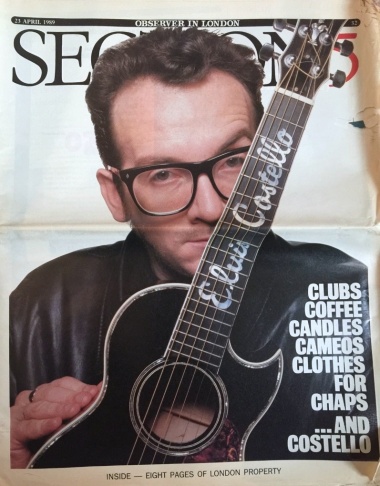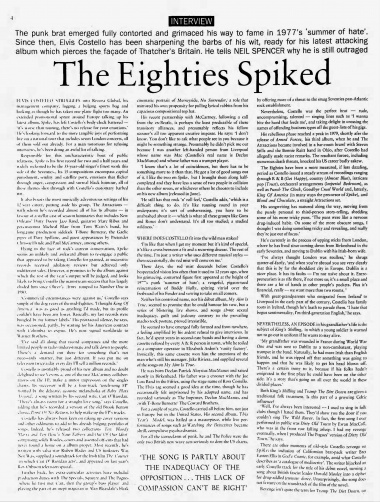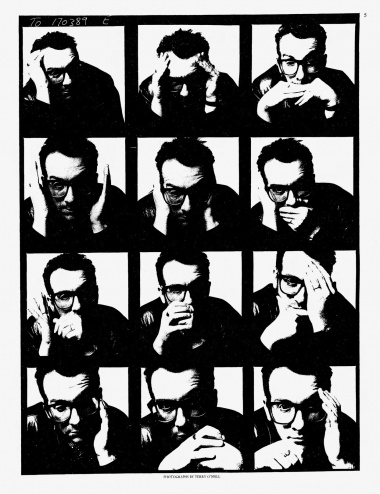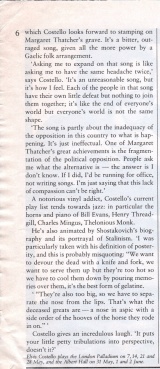London Observer, April 23, 1989: Difference between revisions
m (resize images) |
(formatting / +browser) |
||
| (3 intermediate revisions by 2 users not shown) | |||
| Line 2: | Line 2: | ||
{{:Bibliography index}} | {{:Bibliography index}} | ||
{{:London Observer index}} | {{:London Observer index}} | ||
{{:UK & | {{:UK & Ireland newspapers index}} | ||
{{Bibliography article header}} | {{Bibliography article header}} | ||
<center><h3> The eighties spiked </h3></center> | |||
<center><h3> The | |||
---- | ---- | ||
<center> Neil Spencer</center> | <center> Neil Spencer </center> | ||
---- | ---- | ||
'''The punk brat emerged fully contorted and grimaced his way to fame in | '''The punk brat emerged fully contorted and grimaced his way to fame in 1977's "summer of hate." Since then, Elvis Costello has been sharpening the barbs of his wit, ready for his latest attacking album which pierces the façade of Thatcher's Britain. He tells Neil Spencer why he is still outraged | ||
{{Bibliography text}} | {{Bibliography text}} | ||
Elvis Costello struggles into Riviera Global, his management company, lugging a bulging sports bag, and looking as though he has taken one plane flight too many. | Elvis Costello struggles into Riviera Global, his management company, lugging a bulging sports bag, and looking as though he has taken one plane flight too many. An extended promotional sprint around Europe, talking up his latest album, ''Spike'', has left Costello's body-clock battered — "it's worse than touring, there's no release for your emotions." He's looking forward to the more tangible joys of performing live on a national tour that includes seven London concerts, all of them sold out already. For a man notorious for refusing interviews, he's been doing an awful lot of talking. | ||
Responsible for this uncharacteristic bout of public relations, ''Spike'' is his first record for two and a half years and widely reckoned to be the 35-year-old | Responsible for this uncharacteristic bout of public relations, ''Spike'' is his first record for two and a half years and widely reckoned to be the 35-year-old singer's finest work this side of the Seventies. Its 15 compositions encompass capital punishment, senility and satellite porn, emotions that flicker through anger, compassion and surreal black humour, all of these themes shot through with Costello's customary barbed wit. | ||
It also boasts the most musically adventurous settings of his 12-year career, putting aside his group, The Attractions | It also boasts the most musically adventurous settings of his 12-year career, putting aside his group, The Attractions — with whom he's recorded almost all of his 16 albums — in favour of a stellar cast of session luminaries that includes New Orleans' Dirty Dozen Jazz Band, guitarist Marc Ribot and percussionist Micheal Blair from Tom Waits's band, his long-time production sidekick T{{nb}}Bone Burnette, the Gaelic pipes of Davy Spillane, and guest appearances by Pretender Chrissie Hynde and Paul McCartney, among others. | ||
Flying in the face of | Flying in the face of rock's current conservatism, ''Spike'' seems an unlikely and awkward album to re-engage a public that appeared to be taking Costello for granted, as successive records received adulatory reviews but achieved only indifferent sales. However, it promises to be the album against which the rest of the year's output will be judged, and looks likely to bring Costello the mainstream success that has largely eluded him since "Oliver's Army" romped to Number One in 1980. | ||
"Commercial circumstances were against us," Costello says simply of the dog years of the mid-Eighties. "I thought ''King Of America'' was as good as anything I'd made, but its profile couldn't have been any lower. Basically, my last records were bungled by my former labels." His protracted silence, he says, was occasioned, partly, by waiting for his American contract with Columbia to expire. He's now signed worldwide to Warner Brothers. | |||
"I've said all along that record companies and the more limited people in radio underestimate and talk down to people. There's a demand out there for something that's not necessarily smarter, but just different. If you put me on television twice a day every day I'd sell a million records." | |||
Costello is justifiably proud of his new album and no doubt delighted to see Veronica, one of the two McCartney collaborations on the LP, make a minor impression on the singles charts. | Costello is justifiably proud of his new album and no doubt delighted to see "Veronica," one of the two McCartney collaborations on the LP, make a minor impression on the singles charts. Its successor will be a four-track "torch-song EP" fronted by the delicate, acoustic melancholia of "Baby Plays Around," a song written by his second wife, Cait O'Riordan. "There's always room for a straight love song," says Costello, adding that he's recorded a version of the old Brook Benton classic, "Point Of No Return," to help make up the EP's tracks. | ||
Costello has always been keen on raking up cover versions and other oddments to add to his already bulging portfolio of songs. | Costello has always been keen on raking up cover versions and other oddments to add to his already bulging portfolio of songs. Indeed, he's released two collections (''Ten Bloody Marys and Ten How's Your Fathers'' and ''Out Of Our Idiot'') comprising solely B-sides, covers and assorted off-cuts that had never found a home on a album proper. Most recently, he's written with salsa star Ruben Blades and US funksters Was No Was, supplied a soundtrack for the Irish film ''The Courier'' (in which Cait O'Riordan acts), and appeared on last year's Roy Orbison television special. | ||
Further back, his extra-curricular activities have included production duties with The Specials, Squeeze and The Pogues (where he first met Cait, then the | Further back, his extra-curricular activities have included production duties with The Specials, Squeeze and The Pogues (where he first met Cait, then the group's bass player) and playing the part of an inept musician in Alan Bleasdale's bleak cinematic portrait of Merseyside, ''No Surrender'', a role that mirrored his own propensity for pulling lyrical rabbits from his capacious compositional top hat. | ||
His recent partnership with McCartney, following a call from the ex-Beatle, is perhaps the least predictable of these transitory alliances, and presumably reflects his fellow | His recent partnership with McCartney, following a call from the ex-Beatle, is perhaps the least predictable of these transitory alliances, and presumably reflects his fellow scouser's all too apparent creative impasse. He says: "I don't know. You don't like to ask what people see in you because it might be something strange. Presumably he didn't pick me out because I was another left-handed person from Liverpool whose name was Mac (Costello's real name is Declan MacManus) and whose father was a trumpet player. | ||
"I know that's a lot of coincidences, but there has to be something more to it than that. He got a lot of good songs out of it. I like the two on ''Spike'', but I brought them along half-completed and they have less a sense of two people in collision than the other seven, or whichever others he chooses to include on his new album [released in June]. | |||
"He still has that rock 'n' roll feel," Costello adds, "which is a difficult thing to do. It's like running round in your underpants; it's sort of embarrassing, you have to be unabashed about it — which is what all these groups like Guns and Roses don't understand. It's all too studied; a studied wildness." | |||
These days, the red mist descends before | Where does Costello fit into the wild man stakes? | ||
"I'm like that when I get my moment, but it's kind of special, it's like a cross between a fit and a recurring disease. The rest of the time, I'm just a writer who uses different musical styles — then occasionally, the red mist will come on me." | |||
These days, the red mist descends before Costello's' bespectacled vision less often than it used to 12 years ago, when his grimacing, contorted figure first appeared at the height of 1977's punk "summer of hate"; a vengeful, pigeon-toed reincarnation of Buddy Holly, spitting vitriol over the fretboard of his Fender and vowing to take on all comers. | |||
Neither his contrived name, nor his debut album, ''My Aim Is True'', seemed to promise that he could honour his vow, but a series of blistering live shows, and songs about sexual inadequacy, guilt and jealousy contrary to the prevailing macho rock posture, proved irresistible. | Neither his contrived name, nor his debut album, ''My Aim Is True'', seemed to promise that he could honour his vow, but a series of blistering live shows, and songs about sexual inadequacy, guilt and jealousy contrary to the prevailing macho rock posture, proved irresistible. | ||
He seemed to have emerged fully formed and from nowhere, a feeling amplified by his ardent refusal to give interviews. | He seemed to have emerged fully formed and from nowhere, a feeling amplified by his ardent refusal to give interviews. In fact, he'd spent years in second-rate bands and having a demo cassette refused by every A & R person in town, while he toiled as a computer operator in Elizabeth Arden's "vanity factory." Ironically, this same cassette won him the attentions of the man who's still his manager, Jake Riviera, and supplied several of the songs on ''My Aim Is True''. | ||
He was born Declan Patrick Aloysius MacManus and raised mostly in Birkenhead. | He was born Declan Patrick Aloysius MacManus and raised mostly in Birkenhead. His father was a crooner with the Joe Loss Band in the Fifties, using the stage name Ross Costello. The Elvis tag seemed a good idea at the time, though he has occasionally felt imprisoned by his adopted name, and has recorded variously as The Imposter, Declan MacManus, and (with T{{nb}}Bone Burnette) The Coward Brothers. | ||
For a couple of years, Costello carried all before him, not just in Europe but in the United States. | For a couple of years, Costello carried all before him, not just in Europe but in the United States. His second album, ''This Year's Model'', was hailed as a masterpiece, while live performances of songs such as Watching The Detectives became shrill, compulsive psycho-dramas. | ||
For all the iconoclasm of punk, he and The Police were the only two British new wave acts seriously to dent the US charts, by offering more of a threat to the smug Seventies pan-Atlantic rock establishment. | For all the iconoclasm of punk, he and The Police were the only two British new wave acts seriously to dent the US charts, by offering more of a threat to the smug Seventies pan-Atlantic rock establishment. | ||
Nevertheless, Costello was the perfect brat | Nevertheless, Costello was the perfect brat — rude, uncompromising, talented — singing lines such as ''"I wanna bite the hand that feeds me,"'' and taking delight in crossing the names of offending business types off the guest-lists of his gigs. | ||
His rebellious phase reached a peak in 1979, shortly after the release of ''Armed Forces'', his third album, when he and The Attractions became involved in a bar-room brawl with Steven Stills and the Bonnie Raitt band in Ohio, after Costello had allegedly made racist remarks. | His rebellious phase reached a peak in 1979, shortly after the release of ''Armed Forces'', his third album, when he and The Attractions became involved in a bar-room brawl with Steven Stills and the Bonnie Raitt band in Ohio, after Costello had allegedly made racist remarks. The resultant furore, including numerous death threats, knocked his US career badly askew. | ||
The Eighties have been a more measured, if less dazzling, period as Costello issued a steady stream of recordings ranging through R & B (''Get Happy''), country (''Almost Blue''), intricate pop (''Trust''), orchestral arrangements (''Imperial Bedroom''), as well as ''Punch The Clock'', ''Goodbye Cruel World'' and latterly, ''King Of America'' (in many ways the precursor of ''Spike''), and ''Blood | The Eighties have been a more measured, if less dazzling, period as Costello issued a steady stream of recordings ranging through R & B (''Get Happy''), country (''Almost Blue''), intricate pop (''Trust''), orchestral arrangements (''Imperial Bedroom''), as well as ''Punch The Clock'', ''Goodbye Cruel World'' and latterly, ''King Of America'' (in many ways the precursor of ''Spike''), and ''Blood & Chocolate'', a straight Attractions set. | ||
His songwriting has matured along the way, moving from the purely personal to third-person story-telling, shedding some of his more tricky puns. | His songwriting has matured along the way, moving from the purely personal to third-person story-telling, shedding some of his more tricky puns. "The puns were like a nervous drug-induced habit. On some of the more obscure songs, I thought I was doing something tricky and revealing, and really they're just out of focus." | ||
He's currently in the process of upping sticks from London, where he has lived since coming down from Birkenhead in the early Seventies and moving to Dublin with his Irish-born wife. | |||
"I've always thought London was soulless," he shrugs matter-of-factly, "and when you're abroad, you see very clearly that this is by far the shoddiest City in Europe. Dublin is a nicer place. It has its faults — I'm not naïve about it. Entrepreneurism is as rife there, if not more so; it's a small place and there are a lot of hands in other people's pockets. Plus it's financial, really — we want more than two rooms." | |||
With great-grandparents who emigrated from Ireland to Liverpool in the early part of the century, Costello has family roots in Ireland, though | With great-grandparents who emigrated from Ireland to Liverpool in the early part of the century, Costello has family roots in Ireland, though he's loath to parade them. "I hate that bogus sentimentality, I'm third generation English," he says. | ||
Nevertheless, an episode in his grandfather's life is the subject of "King's Shilling," in which a young soldier is warned not to go out in uniform if he wants to stay alive. | |||
"My grandfather was wounded in France during World War One and was sent to Dublin as a non-combatant, playing trumpet in the band. Naturally, he had more Irish than English friends, and he was tipped off that something was going to happen and that he was likely to get his head blown off. There's a certain irony to it, because if his folks hadn't emigrated in the first place he could have been on the other side. It's a story that's going on all over the world in these divided places." | |||
Both "King's Shilling" and "Tramp The Dirt Down" are given a traditional folk treatment. Is this part of a growing Celtic influence? | |||
"Well, I've always been interested — I used to sing in folk clubs though I hated them. They'd show you the door if you couldn't sing 'The Wild Rover.' In fact, the first song I ever performed in public was 'Dirty Old Town' by Ewan MacColl, who was in the front row falling asleep. I had my revenge eventually, when I produced The Pogues' version of 'Dirty Old Town'," he says. | |||
There are other moments of old-style Costello revenge on ''Spike''; the inclusion of Californian brat-pack writer Brett Easton Ellis in "God's Comic," for example, amid what Costello describes as "a catalogue of mediocrity." The writer hijacked an early Costello track for the title of his debut novel, turning a song about British fascist leader Oswald Mosley into a cipher for drug-addled ''jeunesse doree''. Unsurprisingly, the song does not feature on the soundtrack for the film of the novel. | |||
Revenge isn't quite the term for "Tramp The Dirt Down," on which Costello looks forward to stamping on Margaret Thatcher's grave. It's a bitter, outraged song, given all the more power by a Gaelic folk arrangement. | |||
"Asking me to expand on that song is like asking me to have the same headache twice," says Costello. "It's an unreasonable song, but it's how I feel. Each of the people in that song have their own little defeat but nothing to join them together; it's like the end of everyone's world but everyone's world is not the same shape. | |||
"The song is partly about the inadequacy of the opposition in this country to what is happening. It's just ineffectual. One of Margaret Thatcher's great achievements is the fragmentation of the political opposition. People ask me what the alternative is — the answer is I don't know. If I did, I'd be running for office, not writing songs. I'm just saying that this lack of compassion can't be right." | |||
A notorious vinyl addict, Costello's current playlist tends towards jazz: in particular the horns and piano of Bill Evans, Henry Threadgill, Charles Mingus, Thelonious Monk. | |||
He's also animated by Shostakovich's biography and its portrayal of Stalinism. "I was particularly taken with his definition of posterity, and this is probably misquoting: 'We want to devour the dead with a knife and fork, we want to serve them up but they're too hot so we have to cool them down by pouring memories over them, it's the best form of gelatine. | |||
" 'They're also too big. So we have to separate the nose from the lips. That's what the deceased greats are — a nose in aspic with a side order of the hooves of the horse they rode in on.'{{nb}}" | |||
Costello gives an incredulous laugh. "It puts your little petty tribulations into perspective, doesn't it?" | |||
{{cx}} | |||
'''Elvis Costello plays the London Palladium on [[Concert 1989-05-07 London|7]], [[Concert 1989-05-14 London|14]], [[Concert 1989-05-21 London|21]] and [[Concert 1989-05-28 London|28 May]] and the Albert Hall on [[Concert 1989-05-31 London|31 May]], [[Concert 1989-06-01 London|1]] and [[Concert 1989-06-02 London|2 June]]. | |||
{{tags}} [[Spike]] {{-}} [[The Attractions]] {{-}} [[Dirty Dozen Brass Band]] {{-}} [[Marc Ribot]] {{-}} [[Michael Blair]] {{-}} [[Tom Waits]] {{-}} [[T-Bone Burnett]] {{-}} [[Davy Spillane]] {{-}} [[Chrissie Hynde]] {{-}} [[Paul McCartney]] {{-}} [[Oliver's Army]] {{-}} [[King Of America]] {{-}} [[Veronica]] {{-}} [[Baby Plays Around]] {{-}} [[Cait O'Riordan]] {{-}} [[Brook Benton]] {{-}} [[Point Of No Return]] {{-}} [[Ten Bloody Marys & Ten How's Your Fathers]] {{-}} [[Out Of Our Idiot]] {{-}} [[Rubén Blades]] {{-}} [[Was (Not Was)]] {{-}} [[The Courier: Original Motion Picture Soundtrack|The Courier]] {{-}} [[A Black And White Night]] {{-}} [[The Specials]] {{-}} [[Squeeze]] {{-}} [[The Pogues]] {{-}} [[Buddy Holly]] {{-}} [[My Aim Is True]] {{-}} [[Jake Riviera]] {{-}} [[The Imposter (pseudonym)|The Imposter]] {{-}} [[The Coward Brothers]] {{-}} [[This Year's Model]] {{-}} [[Watching The Detectives]] {{-}} [[The Police]] {{-}} [[Armed Forces]] {{-}} [[Stephen Stills]] {{-}} [[Bonnie Bramlett]] {{-}} [[Get Happy!!]] {{-}} [[Almost Blue]] {{-}} [[Trust]] {{-}} [[Imperial Bedroom]] {{-}} [[Punch The Clock]] {{-}} [[Goodbye Cruel World]] {{-}} [[Blood & Chocolate]] {{-}} [[Any King's Shilling]] {{-}} [[Tramp The Dirt Down]] {{-}} [[The Wild Rover]] {{-}} [[Dirty Old Town]] {{-}} [[Ewan MacColl]] {{-}} [[Less Than Zero]] {{-}} [[Bill Evans]] {{-}} [[Henry Threadgill]] {{-}} [[Charles Mingus]] {{-}} [[Thelonious Monk]] {{-}} [[London Palladium]] {{-}} [[Royal Albert Hall]] | |||
{{tags}} [[Spike]] {{-}} [[The Attractions]] {{-}} [[Dirty Dozen Brass Band]] {{-}} [[Marc Ribot]] {{-}} [[Michael Blair]] {{-}} [[Tom Waits]] {{-}} [[T-Bone Burnett]] {{-}} [[Davy Spillane]] {{-}} [[Chrissie Hynde]] {{-}} [[Paul McCartney]] {{-}} [[Oliver's Army]] {{-}} [[King Of America]] {{-}} [[Veronica]] {{-}} [[Baby Plays Around]] {{-}} [[Cait O'Riordan]] {{-}} [[Brook Benton]] {{-}} [[Point Of No Return]] {{-}} [[Ten Bloody Marys & Ten How's Your Fathers]] {{-}} [[Out Of Our Idiot]] {{-}} [[Rubén Blades]] {{-}} [[Was (Not Was)]] {{-}} [[The Courier: Original Motion Picture Soundtrack|The Courier]] {{-}} [[A Black And White Night]] {{-}} [[The Specials]] {{-}} [[Squeeze]] {{-}} [[The Pogues]] | |||
{{cx}} | {{cx}} | ||
| Line 97: | Line 100: | ||
{{Bibliography notes}} | {{Bibliography notes}} | ||
{{Bibliography next | |||
|prev = London Observer, February 23, 1986 | |||
|next = London Observer, May 14, 1989 | |||
}} | |||
'''The Observer, April 23, 1989 | '''The Observer, April 23, 1989 | ||
---- | ---- | ||
[[Neil Spencer]] interviews Elvis | [[Neil Spencer]] interviews Elvis Costello upon the release of ''[[Spike]]''. | ||
{{Bibliography images}} | {{Bibliography images}} | ||
[[image:1989-04-23 London Observer section 5 cover.jpg| | [[image:1989-04-23 London Observer section 5 cover.jpg|380px]] | ||
<br><small>Section cover.</small> | <br><small>Section cover.</small> | ||
[[image:1989-04-23 London Observer section 5 page 4.jpg| | |||
<small>Page scan.</small><br> | |||
[[image:1989-04-23 London Observer section 5 page 4.jpg|380px]] | |||
<small>Photos by [[Terry O'Neill]].</small><br> | <small>Photos by [[Terry O'Neill]].</small><br> | ||
[[image:1989-04-23 London Observer section 5 page 5.jpg| | [[image:1989-04-23 London Observer section 5 page 5.jpg|380px]] | ||
[[image:1989-04-23 London Observer section 5 page 6 clipping.jpg| | <small>Clipping.</small><br> | ||
[[image:1989-04-23 London Observer section 5 page 6 clipping.jpg|160px]] | |||
| Line 123: | Line 132: | ||
==External links== | ==External links== | ||
*[http://observer.guardian.co.uk Observer.Guardian.co.uk] | *[http://observer.guardian.co.uk Observer.Guardian.co.uk] | ||
*[http://en.wikipedia.org/wiki/The_Observer Wikipedia:The Observer] | *[http://en.wikipedia.org/wiki/The_Observer Wikipedia: The Observer] | ||
<!-- 259014810 259016704 259016738 259016755 259016778 259016818 --> | |||
{{DEFAULTSORT:London Observer 1989-04-23}} | {{DEFAULTSORT:London Observer 1989-04-23}} | ||
Latest revision as of 22:27, 13 March 2021
|



